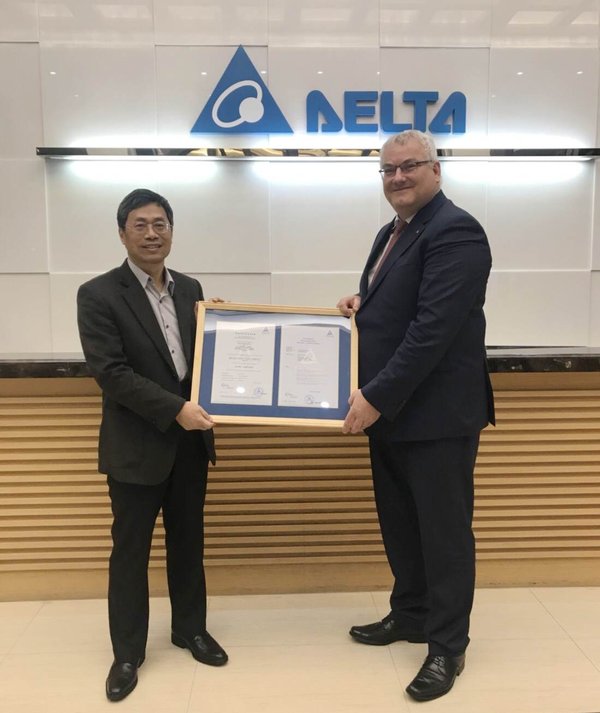TAOYUAN, , Jan. 23, 2018 /PRNewswire/ -- Delta Electronics has achieved another breakthrough in the power-supply sector! Its latest highlight has been development of the High Voltage Generator for X-ray equipment, which recently acquired medical device certification by TUV Rheinland. The affirmation of EU medical devices directive (MDD 93/42/EEC) and medical quality management system (EN ISO 13485) certifications means Delta is now the first power-supply manufacturer in Taiwan capable of manufacturing a medical-grade high-voltage generator for X-ray equipment.

Medical-grade power generators must comply with medical device standards that are more rigorous than for consumer power supplies. In addition to product safety, they must also be assessed on their essential performance, clinical requirements, and usability evaluation. The electric and electronic industry in Taiwan does not have a sound background in the manufacture of medical devices with higher risks. The high-voltage generator for X-ray equipment must provide consistent, high-voltage, high-current output, and stringent requirements have to be met on radiation, stability, and reliability. Due to these demanding requirements, TUV Rheinland engaged experts on medical devices from Taiwan, Japan, and China to carry out the assessment and certification process based on EU harmonized standards and regulatory regulations. The full process took half a year to complete. A lead-shielded laboratory accredited by the Atomic Energy Council was also built expressly by Delta for this product. The R&D and certification process for the high-voltage generator ended up rivaling that for X-ray equipment.
Most of the medical devices industry in Taiwan is currently concentrated on the home care or small medical devices sectors. Since few vendors have ventured into the production and manufacture of high-end medical devices, the recent certifications represent a major breakthrough for Delta. Brian Huang, Vice General Manager of Medical Devices at TUV Rheinland Taiwan, said: "The two certifications completed by Delta this time were MDD 93/42/EEC and EN ISO 13485. ISO 13485 is based on the ISO 9001 quality management system standard, and is the basic threshold for medical devices. The MDD certification is essential for medical devices entering the EU market. It is equivalent to the FDA 510(K) in the US, and applies to medical devices of all risk levels. All medical devices, ranging from blood bags and home healthcare medical devices to large equipment such as MRI scanners, require MDD certification." The MDD directive requires a manufacturer to pass MDD assessment by an EU-authorized notified body before the CE marking can be affixed. Only products that bear the CE marking, indicating compliance with essential health and safety requirements, can be placed into the EU.
Delta chose TUV Rheinland to be its partner for medical devices certification because TUV Rheinland is one of the few certification bodies authorized by the German government to issue MDD certificates. It is also one of the few third-party certification bodies in Asia capable of putting together a transnational team of medical device experts. Japan is the leader in Asia for high-end medical devices, and more than half of its medical device certification market is held by the TUV Rheinland Japan. Certified products have included dental equipment & medical assistive external skeleton.
Mr. Holger Kunz, Executive Vice President Products of the TUV Rheinland Group, has worked in Taiwan and now in Japan. During the certification award ceremony, Kunz said: "The EU is the second-largest medical devices market in the world. Delta's decision to set its sights on the high-end medical devices market for its initial foray into the medical devices sector does not only represent the high standards and expectations the company sets for itself. It also serves as a role model for the rest of Taiwan. TUV Rheinland is very delighted to work with Delta Electronics on raising the standards of the high-end medical devices industry in Taiwan."